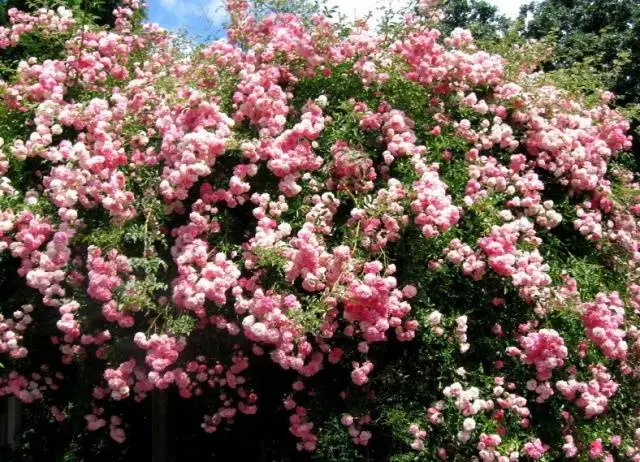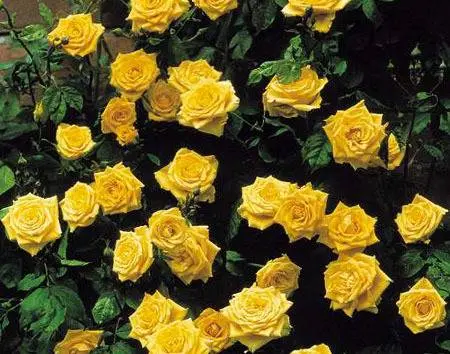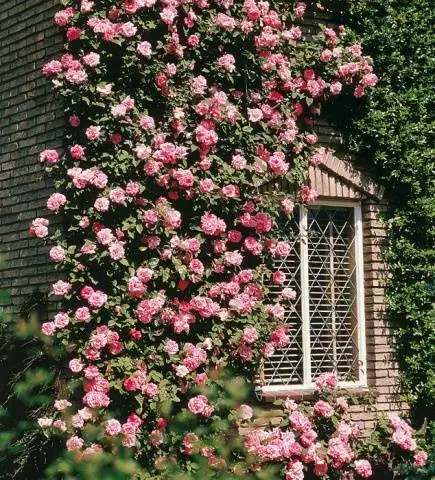Contents
Roses have long been considered royal flowers. They were widely used for decoration of gardens, parks, personal plots. Of course, a few decades ago, flower growers had fewer opportunities to create a unique landscape. Modern lovers of rose bushes have a huge number of new varieties in their arsenal.
Thanks to a rich color palette, different lengths of lashes, you can create any, the most original flower arrangements. As a rule, climbing roses in landscape design occupy a dominant position. The main thing is to choose a place, choose varieties and properly care.
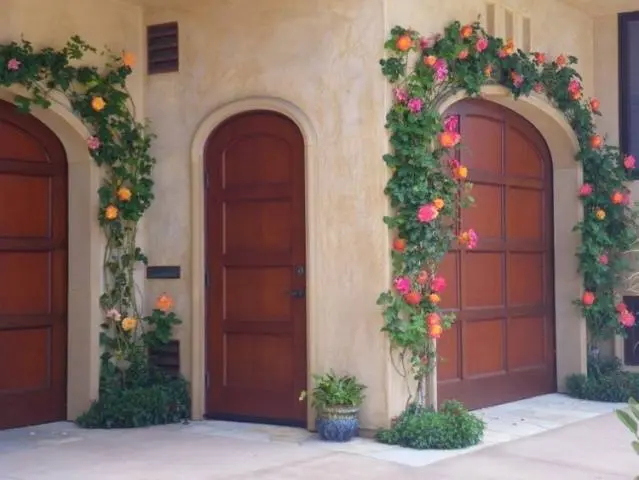
Cultivation technology
When growing climbing roses, you need to pay attention not only to the formation of buds, but also to the length of the lashes. Perfection can be achieved by properly planting, pruning and caring for rose bushes.
Planting Roses
Before planting, seedlings of climbing varieties are soaked for 24 hours in a solution for the development of the root system, then the roots and the entire plant are inspected.
After pruning, the stems and roots of the future queen of flowers are sprinkled with wood ash.
A good seedling should have 3-5 shoots, strong roots. Any damage on the rose bushes is removed. The preparation rules are shown in the picture.

Climbing roses have special requirements for the soil: lightness, nutritional value, the ability to pass oxygen and water. You can add some lime. To increase fertility, you can use humus, phosphate fertilizers, humus.
Climbing roses require a 50×50 hole up to 65 cm deep. At least 100 cm between bushes are important requirements for landscape designers. When planting seedlings, it should be borne in mind that the root neck should be deepened by 10-12 cm. You need to dig holes under future supports, as in this photo, so that later, during installation, the root system of the plant is not damaged.
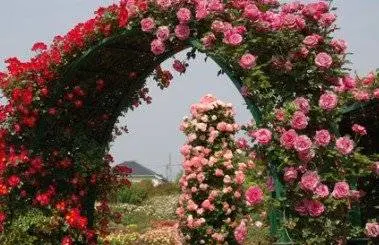
After planting, the soil around the climbing rose is slightly trampled down and watered. Step-by-step instructions for planting roses to create landscape design in the garden or in the country are shown in the photo.

Further care for climbing roses is traditional: watering, fertilizing, pruning and preparing rose bushes for winter. Flower growers who have long been involved in climbing varieties do not always remove the lashes from the support and bend them to the ground. Sometimes the queens of the garden can winter the way they are in the photo.

Stages of creating landscape design
Layout
If you decide to deal with climbing varieties seriously, you need to think about where on the site the rose garden will be located. These types of climbing plants prefer sunny places, but without the scorching sun. Direct sunlight adversely affects the plant itself, but, most importantly, the exoticism of the rose bush is lost.
When choosing a place to plant climbing roses, landscape designers suggest paying attention to shaded areas so that there is no wind there, and the sun illuminates the rose bushes for no more than 6 hours. The picture shows the correct arrangement of rose bushes in a vertical landscape design.
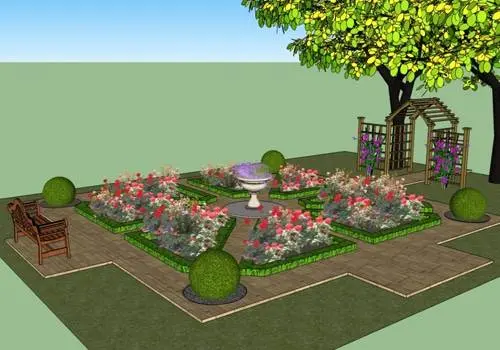
Selection of plants
After you have created a rough landscape design plan, you need to select the appropriate varieties of the queen of the garden. You need to take into account the color range of climbing varieties. The color of the buds should be in harmony with each other.
Climbing roses according to the international classification are divided into three groups:
- They are distinguished by flexible, arched shoots 1,5-5 meters long. Shoots are always bright green with thorns. The color range is extensive. There are varieties with small and large flowers, double or simple, form inflorescences. Flowering is plentiful and long, sometimes up to a month. The small sizes of flowers with abundant flowering give the rose bush (see photo) – harmony and grace. The leaves on rose bushes are dense, glossy, small in size. Frost resistance is high, with slight frosts they feel good with light shelter.

- Plants of this group are obtained by crossing with remontant and tea-hybrid varieties of roses. Shoots grow quickly and reach a length of 4 meters. Varieties belong to creepers, they are called climbing roses. The buds are large, loose. The color palette is wide. Flowering can be in two waves. Plants are winter-hardy, little susceptible to diseases characteristic of climbing roses. These climbing queens in the photo are perfection itself.

- Some roses start to mutate at certain times. And it happens on its own. But breeders choose the most exotic specimens and consolidate the properties of roses. And so the third group appeared, which flower growers fell in love with. These hardy varieties of climbing plants with large buds, with a variety of colors – an excellent material for designers. The whips of climbing roses are long and powerful. But such queens of the garden begin to bloom later. Flower growers gave such climbing varieties the name climbing. They look elegant in landscape design, as confirmation – a photo.

Popular varieties:
- Pierre de Ronsard, Flamentance, Santana and Laguna;
- Kordes, Polka, Sympathy and Rosarium Uetersen;
- Claiming Peace, Aloha, Golden Perfume, Elf and others.
Roses in landscape design
Climbing roses are not exactly vines, although they are woven. They cling to the support with spikes. As a support, you can use arches, gazebos, columns. Plants look good on natural supports, which are the trees in the garden. Often use broom, mountain ash, yew. Having wrapped her lashes around a tree trunk, the queen holds herself perfectly, creating a unique picture.
On each stem, branches will subsequently form, on which fragrant buds will then flourish. Supports can have different shapes and sizes. Flower growers must choose the right direction for the lashes. To decorate a house or a balcony, bushes are planted at a distance of 45 from the wall.
After the appearance of shoots, they are sent in the right direction. Some of the lashes are tied horizontally, while the rest grow upwards.
Such a formation of a bush of climbing varieties is important for landscape design. With the help of rose bushes, you can decorate the walls of houses, fences. Even the old fence is transformed, covered with bright, fragrant flowers. Look at the options in the photo.
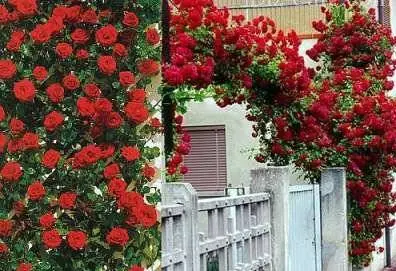
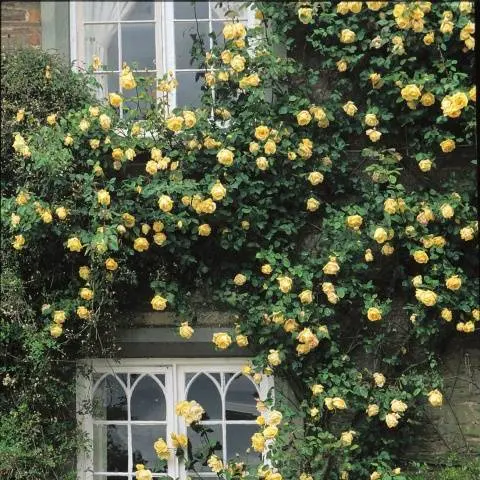
Why not Monomakh’s hat over the entrance to the house of pink buds.
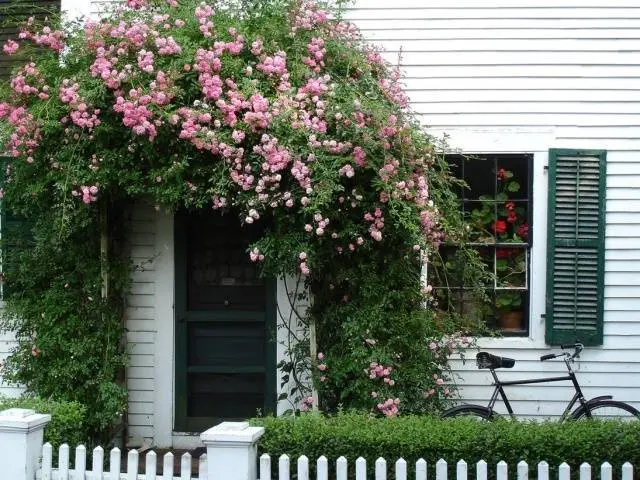
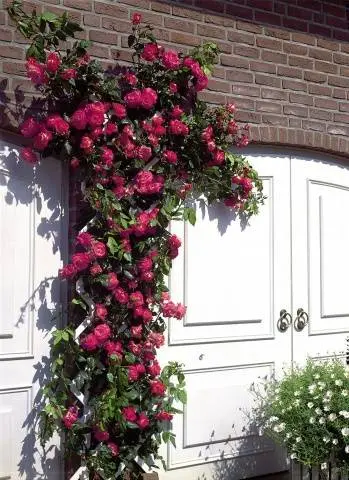
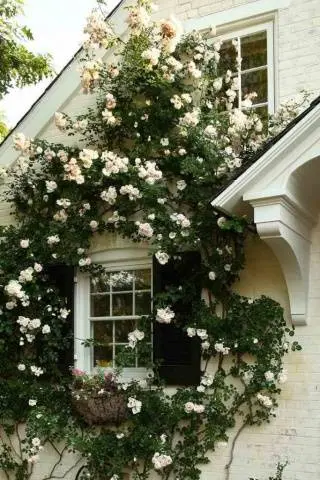
Hedges
As a rule, rose bushes focus on themselves. If you approach the landscape decor with imagination, then at the time of the flowering of the queen of the garden, outbuildings, garages, an unsightly fence or an old stump will “disappear” on the site. Garlands of curly flowers will hide all the flaws. An unusual flower arrangement called a hedge will appear.
In addition to a fence for a hedge, you can adapt trellises, wood lattices, a metal mesh with large cells. Having dug in two pillars, they stretch the wire in several rows – the stylish wall is ready.
Options for using climbing roses for a living wall in landscape design in the photo.
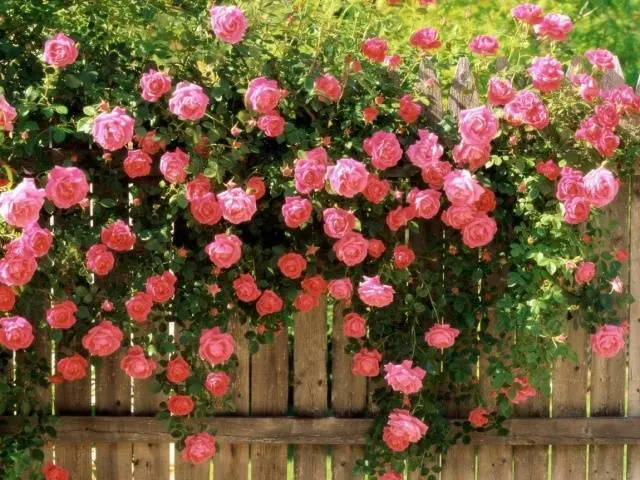
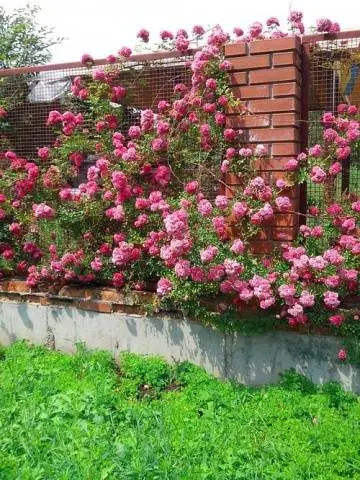
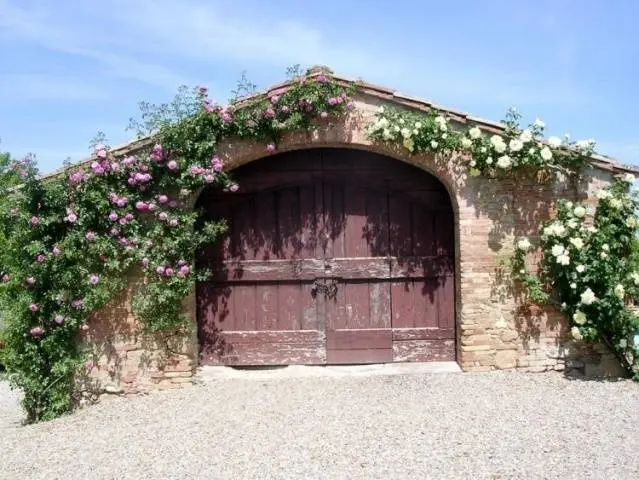
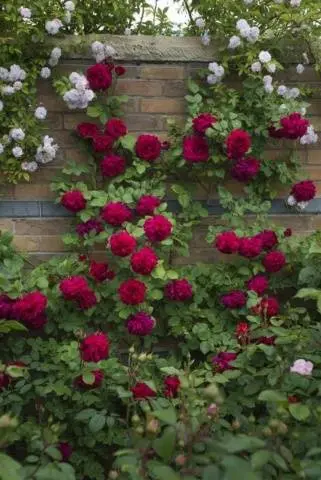
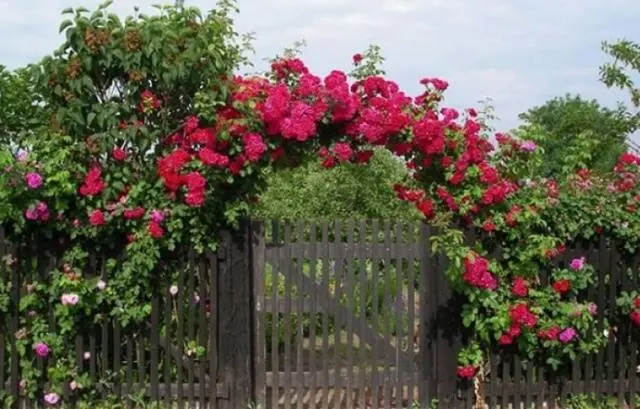
If your fence is low and painted white, you can plant rose bushes with soft pink colors along it. With such a fence, you can separate the working area from the garden. You get a Provence-style garden, as in the photo below.
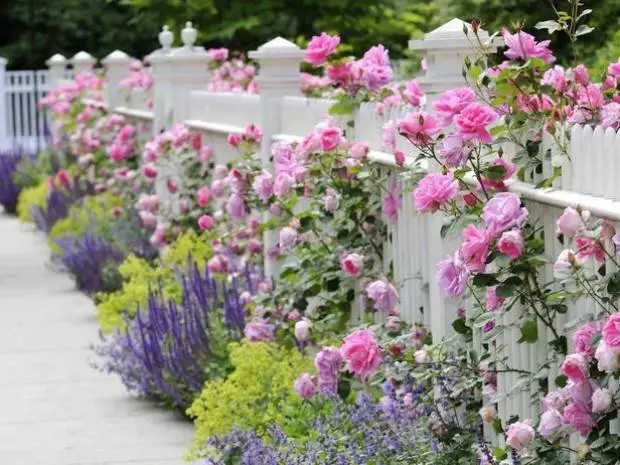
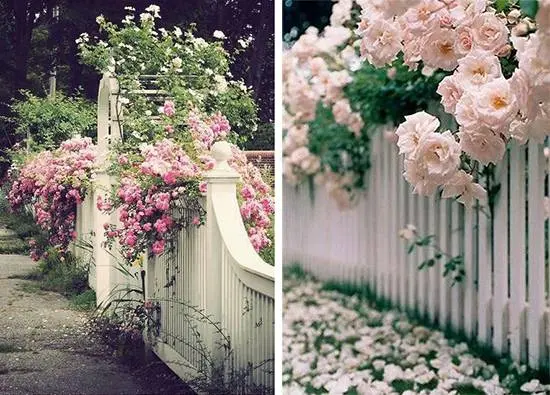
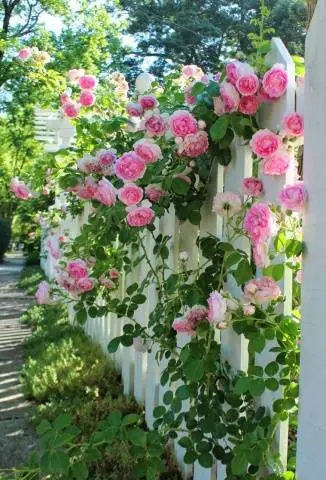
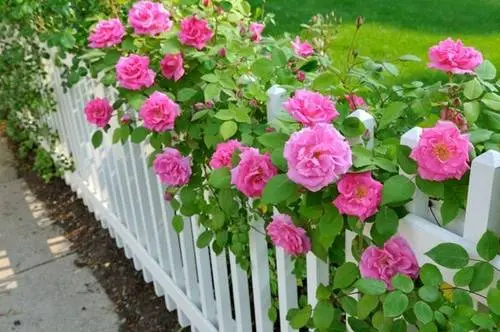
Arches and pergolas for roses
Climbing roses are the best material for landscape design when decorating arches, small statues and trellises. Everyone dreams of solitude, where you can dream, gather your thoughts or just relax. And blooming roses create a romantic atmosphere.
Arches can be located anywhere in the garden, they are often installed directly above the entrance to the courtyard. Such supports can be wooden, metal and even thick wire.
And as an addition – bushes and trees, various flowers. Although arches and pergolas are called classics of style, they occupy an important place in landscape design. Look at the pictures, what could be better!
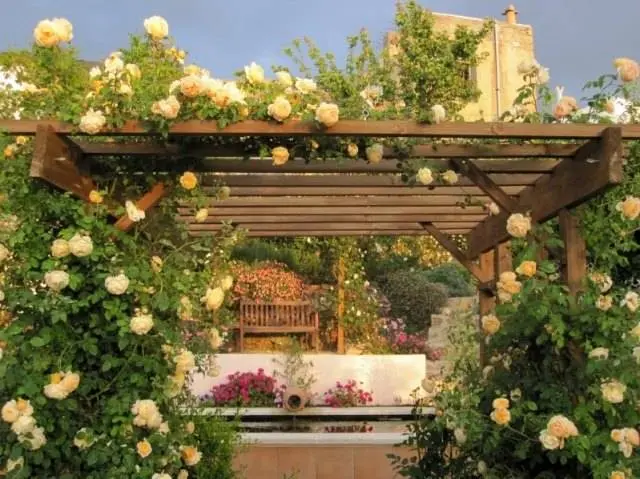
Look at the photo below. What an amazing decision by landscape designers: a white arch and red climbing roses!
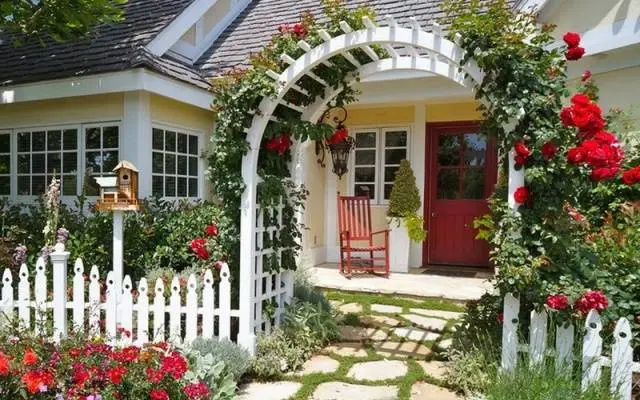
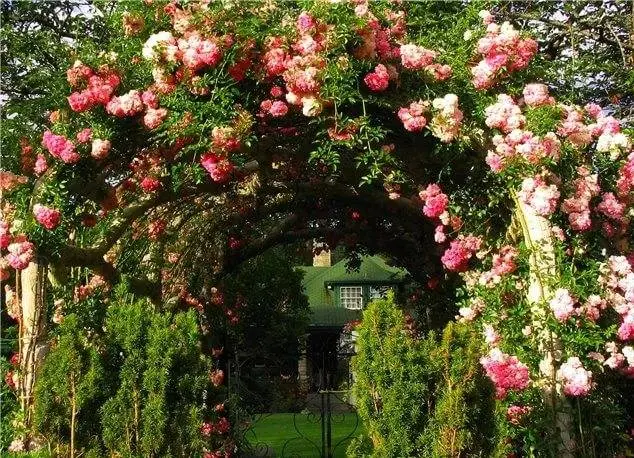
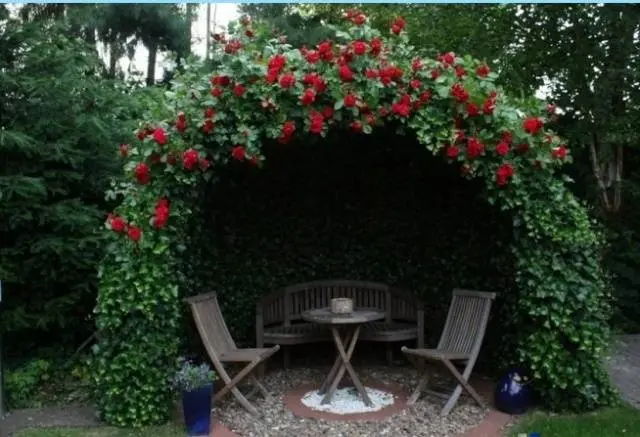
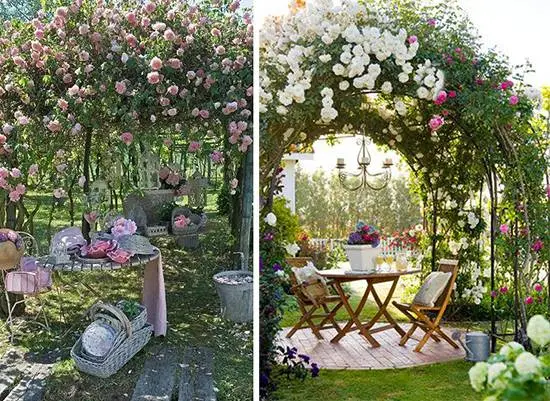
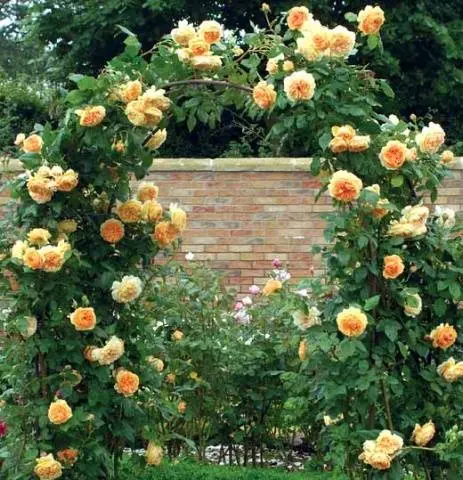
If you want a rose to wrap around a pole or arch, its shoots are arranged in a spiral, gently twisting onto a support. Arch of climbing roses in the photo.
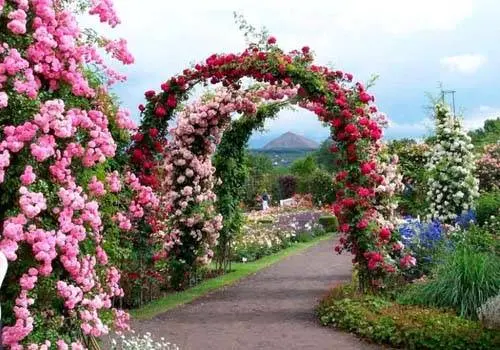
Video about climbing roses in landscape design:
In conclusion, useful tips
There is a reverent attitude to climbing roses in landscape design. The queen of the garden contributes to the creation of a romantic mood. The picture can be smeared if you make a mistake when choosing the color palette of climbing rose varieties. Colors should harmonize, not oppose each other.
Useful tips:
- White color is the most loyal. Bushes with yellow, light blue flowers can be planted next to white roses. It is not bad to dilute the composition with plants that have gray foliage.
- Orange, blue, blue flowers look good next to yellow roses,
- To rose bushes with bright orange and red buds, you can add plants with blue, blue flowers or grass with yellow-green leaves.
- Nothing is planted with roses with orange, apricot and peach shades of buds. Otherwise they will lose their individuality.
- Varieties of red roses with orange or purple hues should be planted away from each other.
Every person is a dreamer and experimenter by nature. Through trial and error, you can always find a twist in the combination of climbing roses with other plants. Create your own landscape design projects for your site and share with rose lovers, send unique photos.










